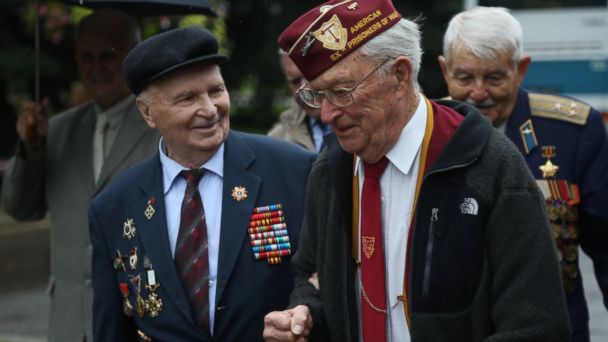WW2 Vet Thanks Those Who Saved Him 70 Years Ago

(Credit: Stefan Mizha/U.S. Embassy Moscow)
MOSCOW - There was a moment, shortly after he was liberated from a Nazi prisoner of war camp by Soviet soldiers, that remains etched in Leroy Williamson's mind.
The Texan came across a group of Russians singing and dancing for joy. They soon brought over a pair of cows for them to eat, his first taste of fresh meat in over a year. They also brought in a donut machine, Williamson recalled with a smile.
This week, nearly 70 years later, Williamson traveled here to salute the Russian soldiers who fought to save him.
"I'm here is to just say thank you to the veterans," he said. He was pleasantly surprised to find that the gratitude is mutual.
Easing into an armchair, Williamson smiled and recounted the Russian general who invited him to lunch the day before, the aging Soviet war veterans who embraced him, and the Kremlin honor guard that escorted his visit to lay a wreath at Moscow's memorial to the Great Patriotic War, as World War Two is called in Russia. Ordinary Russians have welcomed him with open arms once they find out his story.
"It's been wonderful," he gushed. "I am so pleased with the attitude of the people here."
He had planned to meet with a surviving member of the Red Army's 44th Infantry Division, which liberated his camp, but the night before that man fell sick and had to be hospitalized.
Instead, Williamson was able to present a Purple Heart, awarded to those injured in battle, to a Soviet soldier who fought alongside American troops during the war. The man was overcome with emotion.
"He really gave me the bear hug," he chuckled.
At 93 years strong, Leroy Williamson retains an easy laugh and firm handshake. His voice only dips as he recalls his time in the Nazi camp.
Williamson did not even speak about his time as a prisoner of war until just a few years ago. Now he casually mentions daring anecdotes about smuggled radios and digging escape tunnels in passing as if talking about the weather.
During a bombing mission over Germany in April 1944, Williamson, then a 23-year-old 2nd lieutenant, was shot down. His memory of the day is as clear today as ever, yet he hesitates to describe what that it was like.
"When you can say you've survived that's the good part," he said before a long pause. "Naturally, the people (on the ground) didn't look at us very kindly."
Williamson spent several days in interrogation before being transferred to a prisoner of war camp on the Baltic Sea. During the winter, a cold wind roared off the water, just a few blocks away. At night, Allied bombs landed nearby.
He would remain there for 14 grueling months until May 1, 1945, just a week before Allied victory was declared, when Soviet troops pushed from the east "like gangbusters" and liberated his camp.
"They not only liberated us from prison camp, they did so many other good things for us," he said.
Those were heady times. The Americans and the Soviets had both fought against Nazi Germany and Williamson recalled the outpouring of support from the Soviets after President Franklin Roosevelt died.
That camaraderie, of course, would not last.
As the Cold War set in, Williamson would soon find himself on the other side of the Soviets as he flew supply runs as part of the Berlin Airlift when the city was cut off from West Germany. Soviet fighter jets would scramble to meet them.
"A Russian MIG would come, drop its flaps and wheels, stay with us a few minutes," he recalled. "I'd give a salute back and that was it."
Williamson was reticent when asked about the latest tensions between the United States and Russia, but offered a stern warning from a man who has witnessed the best and worst of US-Russian relations.
"We have to get along," he insisted. "We don't need a patriotic war or a World War 3."